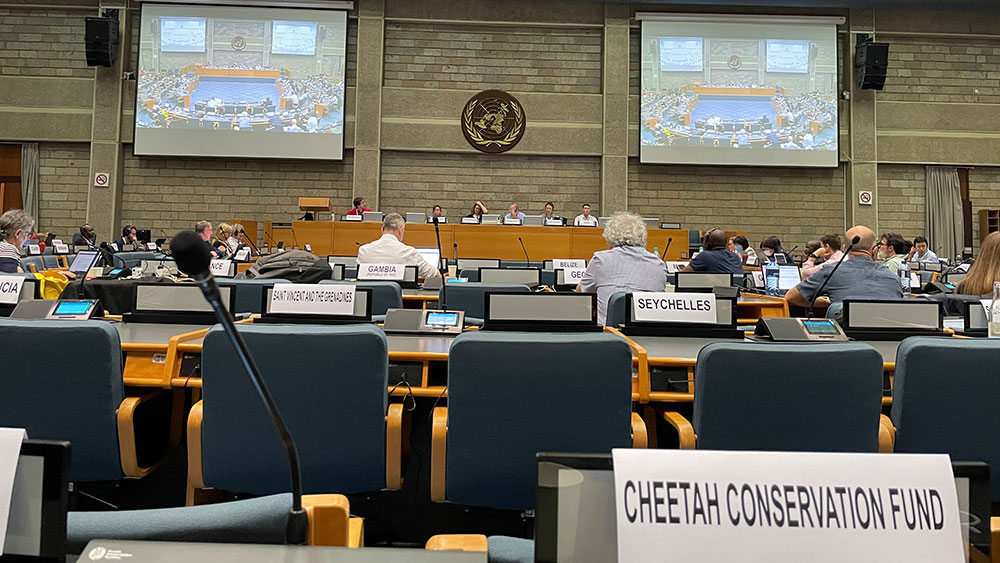Across Borders and Beyond: Charting CCF’s Global Conservation Efforts
-

- by Edwin Brown December 16, 2023

One of the best parts of my work as CCF’s Senior Adviser for Illegal Wildlife Trade and Policy is that I get involved in a variety of activities. I just returned from a trip to Africa that included visiting multiple countries (Ethiopia, Kenya, and Somaliland), and taking part in multiple events.
My time in Somaliland focused on institution building. I joined a group of government officials and CCF’s legal consultants to complete the draft text of a new Somaliland forest and wildlife law. This proposed legislation will provide a more modern and comprehensive framework for governance of Somaliland’s forest and wildlife resources, including stronger law enforcement measures and penalties against wildlife trafficking and other forest and wildlife crimes. The new law will benefit CCF by providing a more stable legal and regulatory regime for establishing and managing protected areas, including the Geed Deeble landscape where CCF’s cheetah center is located. The draft text of the new law has been translated into the Somali language and is under review by the government. We hope it will be taken up by Somaliland’s Parliament in January.

I then worked with another set of government officials and CCF’s law enforcement consultant to develop a draft charter and terms of reference for a coordinating committee to guide the government’s policies, strategies, and enforcement operations in response to illegal wildlife trade. These documents are now under review by the government agencies that will be members of the committee. We expect the committee to be formally launched in early 2024.
These institution building efforts are supported by CCF projects financed by the UK government through its Illegal Wildlife Trade Challenge Fund, and the European Union. CCF’s partners in these projects include the Somaliland Ministry of Environment and Climate Change (MoECC), Legal Atlas, TRAFFIC, and Welthungerhilfe (World Hunger Help).
My stopover in Ethiopia was brief, and focused on strengthening CCF’s partnership with the Ethiopian Wildlife Conservation Authority (EWCA). EWCA has been an important partner for CCF in the Horn of Africa region for over a decade. Ethiopia is the site for many CCF project activities including community awareness campaigns, surveys of habitats for cheetahs and other wildlife, research on cheetah genetics, and training for wildlife authorities and veterinarians. Most of these activities are funded by the U.S. Fish and Wildlife Service and the UK. EWCA will co-host the Global Cheetah Summit CCF is organizing in Addis Ababa, Ethiopia, in January, 2024.
My next destination was Nairobi, Kenya, where I represented CCF at a week-long workshop organized by the Convention on Trade in Endangered Species (CITES). CITES is a global agreement that, as its name implies, establishes rules to regulate international trade in endangered species of animals and plants to protect them from overexploitation and extinction. CITES requires that countries exporting and importing endangered species make scientific findings that the export, as well as the purpose of the import, will not have a detrimental impact on the species in question. The purpose of the workshop was to help create standardized guidance for this process. Not surprisingly, the participating countries and NGOs had many different opinions on what the guidance should say, which led to spirited discussion and debate. CCF’s main concern was how the guidance would address issues specific to the most highly endangered species such as cheetahs. The process of writing this guidance is not over, but the workshop was an important step forward.

From Nairobi, I returned to Somaliland, where I caught up with CCF’s Executive Director Dr. Laurie Marker. We worked on planning the Cheetah Summit and observed an environmental awareness training session for schoolteachers that was part of CCF’s IUCN/SOS funded project. In the midst of this activity, the Center received three cheetah cubs newly confiscated from traffickers by the MoECC and Somaliland police. The arrival of cubs at the Center is always an all-hands event for the staff since the young cats usually need urgent medical treatment and require around-the-clock care.
Throughout my travels, I remained in close contact with Dr. Marker and CCF’s Director for Wildlife Crime and International Policy Dr. Shira Yashphe, to make sure we were on the same page with all the happenings. After six weeks on the road, I arrived home on December 17, just in time to start getting ready for the holidays, after which I will look forward to returning to Africa at the end of January.

